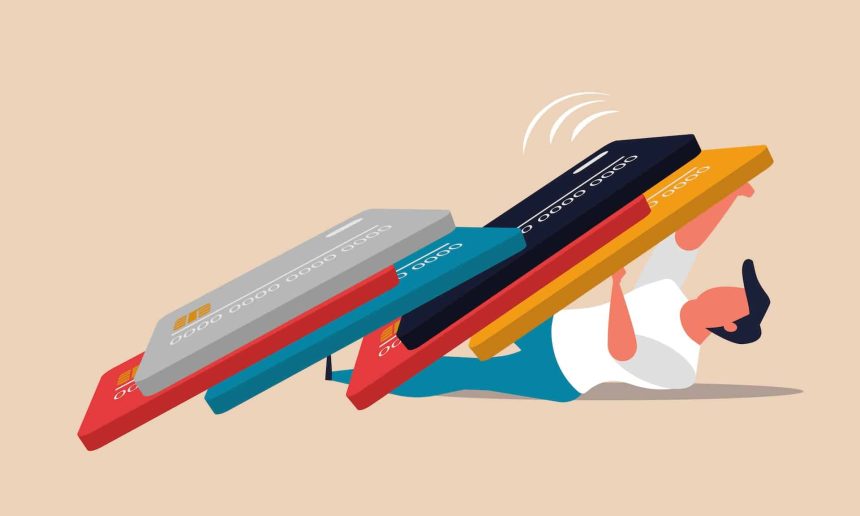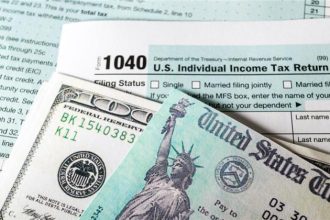Credit Sesame discusses debtflation and how consumer outlook on the economy may be a self-fulfilling prophecy.
Several economic indicators suggest the economy is thriving. Unemployment is low, GDP is growing, and the stock market is booming. So why did consumer confidence fall in March 2024? Even before that, consumer outlook for the future was already down to levels traditionally associated with a recession. Are people being unreasonably glum? Maybe they are more focused on the impact debt has on their household finances than on broad economic indicators.
Inflation is weighing on consumer confidence
The Conference Board announced last week that its Consumer Confidence Index declined in March. While the decline was slight, the details suggest what’s troubling American consumers.
Consumers are more troubled about the future than they are about the present.
The Consumer Confidence Index has two components: the Present Situation Index and the Expectations Index. As the names suggest, the Present Situation Index measures consumers’ feelings about today’s economy, and the Expectations Index measures their outlook for the economy in the near future.
One revealing thing about the March 2024 data is that the Present Situation Index rose, but the Expectations Index fell. Consumers seem to agree with economic indicators that the economy is growing; they just don’t expect this success to continue.
Concern about the future is serious
For the second consecutive month, the Expectations Index was at a level traditionally associated with recessions. People aren’t just expressing a little uncertainty about the future; they are downright pessimistic about it.
This is doubly concerning because consumer pessimism can become a self-fulfilling prophecy. People who are concerned about the economy may cut back their spending. If enough consumers do this, a recession could become a reality.
Inflation is a particular concern
A big part of consumers’ concerns is inflation. This was a recurring theme in the comments accompanying the Consumer Confidence survey. In fact, the average inflation rate consumers expect over the next 12 months edged up a little in March.
The perception is even worse than the reality
Given the experience of the past couple of years, concern about inflation is understandable. However, consumers seem to be perceiving inflation as worse than it actually is. In the March Consumer Confidence survey, consumers reported an average expectation of 5.3% for the next 12 months. This is slightly above the average inflation expectation, which has not been under 5.2% for the last four years.
Consumers expect an inflation level higher than it’s been for some time. While the year-over-year inflation rate rose as high as 9.0% in mid-2022, it’s been below 5% since March last year and below 4% since June.
Consumers may be experiencing debtflation
If many people perceive inflation as worse than it actually is, it may be because they’re experiencing something we can call “debtflation.” Think of this as the rise in the cost of living caused by carrying debt. Two clear-cut trends over the past few years have been a rapid increase in debt and a sharp rise in interest rates.
Over the past three years, total household debt has risen by more than 20%. Revolving consumer debt, which is typically more expensive than other conventional borrowing, has increased by more than 36% during the same period. Meanwhile, interest rates have risen sharply.
When you add that up, American consumers are paying more than twice as much interest (except mortgage interest) as they did three years ago. This represents a much more rapid expense increase than the 17.8% official inflation rate.
In short, debtflation reflects the reality that incurring debt adds to your cost of living. This is especially true when interest rates are rising.
Is debtflation causing consumer behavior to match sentiment?
If debtflation is causing Americans to feel gloomy about their economic future, that may have resulted in less borrowing. Total non-mortgage consumer debt grew by over 7% in 2021 and 2022 compared to 2.57% in 2023.
If a recession happens partly because of falling consumer confidence and reduced spending, this could cause some financial challenges for Americans. On a positive note, it could bring borrowing and inflation firmly back under control. After a post-pandemic spending spree, it may be time to rein in household budgets and manage your credit for the future.
If you enjoyed Americans feeling the impact of debtflation you may like,
Disclaimer: The article and information provided here is for informational purposes only and is not intended as a substitute for professional advice.
Read the full article here
















